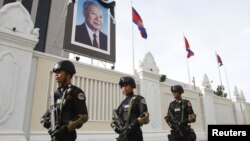BANGKOK —
Leaders in Asia will be gathering in Cambodia later this month (Nov 18-20) for a summit of the Association of Southeast Asian Nations. Territorial tensions between ASEAN members and China marred a summit in July, adding pressure to the meeting as President Obama is set to make a historic visit.
The last regional meeting of the Association of Southeast Asian Nations was considered a disappointment after the group failed, for the first time, to issue a joint statement.
Many blamed China, saying it influenced Phnom Penh to block a statement that included concerns by Vietnam and the Philippines over South China Sea territorial disputes.
With President Obama expected at the ASEAN East Asia Summit, Ernie Bower, at the Center for Strategic and International Studies in Washington, says the gathering is an opportunity for Cambodia to pursue a more balanced foreign policy.
"This balance doesn’t mean balancing the United States and China," said Bower. "But it means working with all players and a recognition that ASEAN is very important. I don’t think that recognition came thru in July. So Cambodia has an opportunity - [Cambodian leader] Hun Sen has an opportunity - in November to make that point.”
China has stepped-up aggressive claims to island territory in the South China Sea, raising international concerns including from the United States.
ASEAN has been trying to negotiate a code of conduct with China to prevent conflicts.
But Beijing prefers to deal with ASEAN members one-on-one rather than as a group.
"The setback in July is a serious one because this means that there is more pressure now in November at the East Asia Summit and the sideline meetings to have a code of conduct," said Thitinan Pongsudhirak is Director of Bangkok's Institute of Security and International Studies. "So, some drama is in store because China will apply a lot of pressure. Remember that China has some domestic concerns now, they're going through a leadership transition. It's not a good time for the Chinese leadership to appear weak."
President Obama is being urged to push ASEAN on human rights concerns.
But the bloc is only expected to adopt a watered-down regional declaration of human rights at the summit.
Phil Robertson, Deputy Asia Director for Human Rights Watch, says the declaration is a far cry from international standards.
"The general principles set out a series of exemptions or loopholes based on local context, based on balancing of rights with responsibilities, based on national security or internal stability, that would limit rights in a way that the international standards do not limit rights," he said.
Robertson says President Obama should also raise Cambodia's deteriorating human rights situation when he meets with Prime Minister Hun Sen.
The last regional meeting of the Association of Southeast Asian Nations was considered a disappointment after the group failed, for the first time, to issue a joint statement.
Many blamed China, saying it influenced Phnom Penh to block a statement that included concerns by Vietnam and the Philippines over South China Sea territorial disputes.
With President Obama expected at the ASEAN East Asia Summit, Ernie Bower, at the Center for Strategic and International Studies in Washington, says the gathering is an opportunity for Cambodia to pursue a more balanced foreign policy.
"This balance doesn’t mean balancing the United States and China," said Bower. "But it means working with all players and a recognition that ASEAN is very important. I don’t think that recognition came thru in July. So Cambodia has an opportunity - [Cambodian leader] Hun Sen has an opportunity - in November to make that point.”
China has stepped-up aggressive claims to island territory in the South China Sea, raising international concerns including from the United States.
ASEAN has been trying to negotiate a code of conduct with China to prevent conflicts.
But Beijing prefers to deal with ASEAN members one-on-one rather than as a group.
"The setback in July is a serious one because this means that there is more pressure now in November at the East Asia Summit and the sideline meetings to have a code of conduct," said Thitinan Pongsudhirak is Director of Bangkok's Institute of Security and International Studies. "So, some drama is in store because China will apply a lot of pressure. Remember that China has some domestic concerns now, they're going through a leadership transition. It's not a good time for the Chinese leadership to appear weak."
President Obama is being urged to push ASEAN on human rights concerns.
But the bloc is only expected to adopt a watered-down regional declaration of human rights at the summit.
Phil Robertson, Deputy Asia Director for Human Rights Watch, says the declaration is a far cry from international standards.
"The general principles set out a series of exemptions or loopholes based on local context, based on balancing of rights with responsibilities, based on national security or internal stability, that would limit rights in a way that the international standards do not limit rights," he said.
Robertson says President Obama should also raise Cambodia's deteriorating human rights situation when he meets with Prime Minister Hun Sen.




